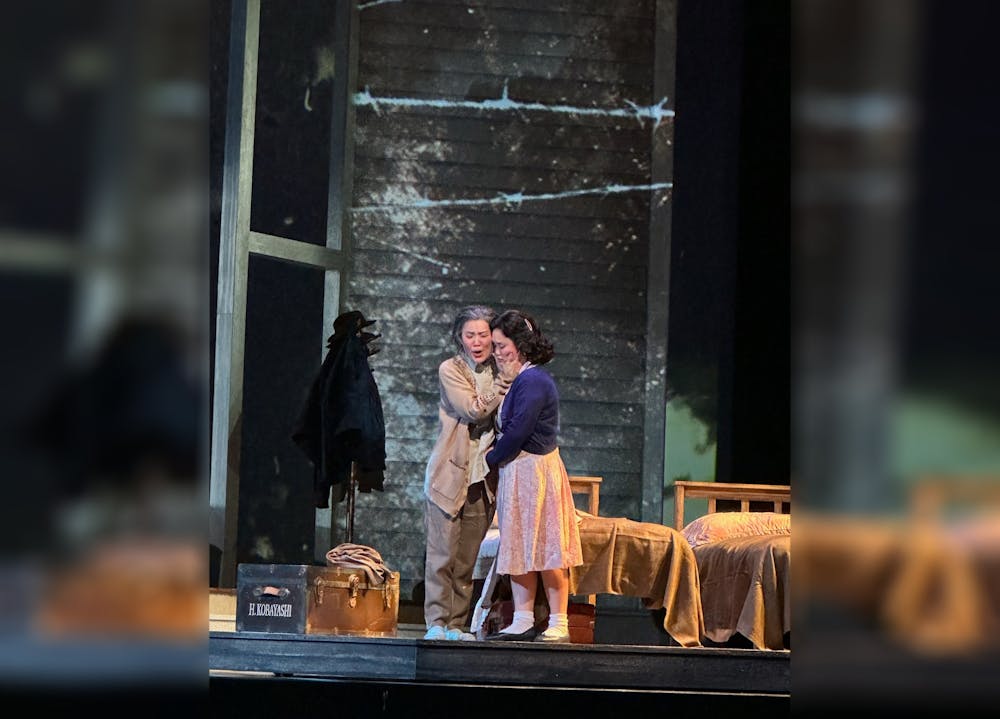“An American Dream” originally premiered at the Seattle Opera in 2015. It tells the story of Setsuko Kobayashi, a Japanese American girl whose family is sent to an internment camp during World War II and Eva Crowley, the Jewish immigrant who escaped Germany and moves in to the Kobayashis’ home.
The opera was guest directed by Richard Gammon and conducted by Judith Yan. The production featured IU masters students Abigail McKay and Emily Sipes as Eva Crowley and IU junior Talinaiya Bao and IU artist diploma student Siyi Yan as Setsuko Kobayashi.
This is the first time “An American Dream” has been performed at the Jacobs School of Music, and the cast was aware of the importance of being first at the school to show their take on it. Composer Jack Perla said the students took on the material well at a panel held after opening night, comparing them to professional actors.
“Pros are pros,” Perla said. “They’ve been doing it for years and so they can zero in on what will land, how to get a line across the stage into the house, how to deal with so many complexities, all these things the audience doesn’t even notice.”
Perla said that what made him so excited about this production was not only the students’ ability to handle the production’s difficulties in the way professional opera performers did, but also their ability to dig into the material and truly understand what their characters were experiencing.
He said one example of this came at the end, when Setsuko returns to her home to reclaim her doll which she hid at the beginning of the opera, ultimately leaving it behind. Perla said that scene had gone through several changes before landing on the final version.
“What’s very interesting about working with a new cast is exploring different ideas,” he said. “I told (Bao and Yan) in a private moment that (Setsuko) is quite literally leaving her heart on the table as she says goodbye to this home and to her papa.”
Sipes performed as Eva on Feb. 3 and said she was excited the cast had such an active role in shaping the story, an opportunity not common as most operas performed are older and more established productions, seldom open to change.
“We have been able to kind of adapt and put our own take on everything,” Sipes said. “I’ve loved collaborating with all the people in the opera to create this narrative.”
Eva is a young Jewish-American woman who moves into the Kobayashis’ home after they are taken to the internment camps. She worries about her parents who are still in Germany, and her husband, who keeps a terrible secret from her about their new home.
Sipes said when inhabiting the character of Eva, it was important to make her performance feel authentic for the audience. There were many differences between her and Eva such as background and religion that it was initially difficult for Sipes to enter Eva’s mindset. By concentrating on the similarities — a love of family and the navigation of a new relationship (Sipes is recently engaged) — Sipes said she could put herself into Eva’s shoes.
“My fiancé actually has a funny way of putting it, he says ‘public in private’ to describe opera and theater,” Sipes said. “That’s really what it is, how we’re living this very private life in public, in front of an audience.”
Doctoral student Esther Yi-An Tien who played Setsuko’s mother Hiroko Kobayashi Feb. 3 was also able to identify with her character. Yi-An Tien said she could relate to “An American Dream” due to her family’s connection to the setting of the opera with her two grandparents living through World War II as a soldier and a refugee respectively.
“I feel very excited because there hasn’t been a lot of opera that the school has done that I’m like ‘oh wow this is gonna be my opera,’” Yi-An Tien said. “It always feels like someone else’s story, however, this opera really, really speaks to me.”
Yi-An Tien said she felt the opera had a place in it for her with her feelings of being caught between two cultures. After living in America for ten years, she said that she felt too Asian for America and too American for her home country. Yi-An Tien connected this to her grandfather who had a similar experience when he studied in the American south in the 1950s.
“He told me that he didn’t know where to sit when he was on a bus because he is Asian,” Yi-An Tien said. “He would be sitting in the colored section and then Black people would look at him like, why are you here, and then he’ll get up to the other side of the bus at the white place and people would be like, what are you doing?”
However, Yi-An Tien felt that there were two sides to the idea of the “American dream” as her grandfather was ultimately able to achieve it. He was one of the few people in Yi-An Tien’s home country to gain a medical education, becoming a successful doctor. Yi-An Tien said that despite the struggles in this country, “An American Dream” offered hope for the future.
“This country has given me so much like being able to perform, work like this,” she said. “There’s a lot of people advocating such as writing this opera and IU performing this opera, there’s always a lot of good still, so I have a lot of hope seeing this project being brought to IU.”




